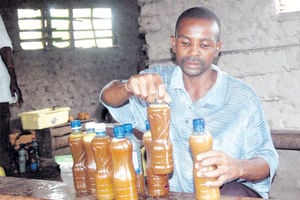
Samini Thoya climbs a palm tree to tap palm wine in Makomboani village in Kilifi County in April 2024.
Every morning at around 7am, a group of men and women, young and old, head towards Makomboani village in Kaloleni constituency, Kilifi County.
Their destination is the residence of Samini Thoya, a renowned tapper of the traditional palm wine, locally known as 'mnazi'.
Some are going to quench their thirst at the den commonly known as 'mangwe' which is run by Mr Thoya, before starting the day's work, a routine they have held for ages, while others are going to buy the drink wholesale for resale.
For over 28 years now, Mr Thoya has spent his entire life in the village, farming and harvesting palm wine, a skill passed down from his father and grandfather.
“I left school in Class Six (now grade six), spending my days tending to cattle and assisting my father in tapping palm wine,” he says.
Every day when his father woke up in the morning, Mr Thoya would assist him in tapping palm wine. That is how he mastered the art of climbing coconut trees, enduring the dangers that lurk in this job. Since then, he has earned a living from palm tapping and selling the wine to locals.
Now, 28 years later, the expertise of scaling palm trees and tapping wine has become his greatest accomplishment.
"However, I wouldn't want my children, (he has five) to go the same way my father forced me to. I want to educate them up to the university level," he says.
He has hired both women and men who assist him in serving and delivering his wine to customers in various locations.
“I have been able to provide jobs in my community, especially for women whom I pay Sh250 per day from the over Sh2,000 I earn daily. It's like working in an office," he says.
His job, he says, has no breaks; just as drinkers do not rest, the palm wine tapper must keep working. From wine tapping, he has also managed to construct his home and purchase livestock.
“My children can attend school, I can eat what I desire, I don't have to pay rent, and because of this, I will never leave my village for anything else,” he proudly declares.
Every morning, after saying his dawn prayer, he begins his ascent to collect the sap from the coconut tree's cut flower, the source of 'mnazi'.
This routine starts promptly at 5am.
“The sap is collected by tapping the palm. This process involves creating a small incision in the palm's bark, approximately 15cm from the top of the trunk. A clean gourd is fastened around the tree to gather the sap as it flows into it. The sap is collected daily,” he says.
He explained that fermentation begins shortly after the sap is collected, and within an hour or two, the alcohol content becomes quite high. Nevertheless, most of the time, customers are already waiting for him as soon as he descends from the palm tree.
"People arrive here very early, some even come from distant places like Bamburi, Samburu, and other areas where I supply my wine," he says.
Upon visiting his home, the Lifestyle team observed numerous palm trees.
Despite being a routine he has performed many times, each new day brings the possibility that it could be his last.
Even someone as experienced as him can have a dangerous fall that might result in death or paralysis, leaving his family in a desperate situation.
"I am always on high alert because I lack proper safety equipment like safety harness belts or gripping boots that power company technicians use when climbing electricity poles. Additionally, I sometimes encounter snakes," he says.
Traditionally, there are strict rituals to be observed when consuming alcohol, such as libation, which involves pouring to the ground an alcoholic drink before the first sip.
This practice is especially important before he begins selling his wine.
Furthermore, the palm wine tapper, who safely descends from a coconut tree, is obligated to offer at least two bottles before distributing the remainder to the sellers.
"This ritual is performed to ward off evil spirits and show gratitude to the gods because the challenges we face up there are not to be taken lightly," he says.
Following these rituals, he serves his customers using a slim cylindrical gourd straw derived from the mango plant, known as ‘mboko’.
This age-old tradition, however, is quickly disappearing due to the rise of modern containers becoming the main choice at popular drinking spots.
Kadzo Kenga, a waitress at Mr Thoya's drinking den, says that Mnazi has helped her educate her children and appreciates its cultural significance.
She highlights its role in ceremonies such as weddings, child naming, and birthday parties, considering it precious.





